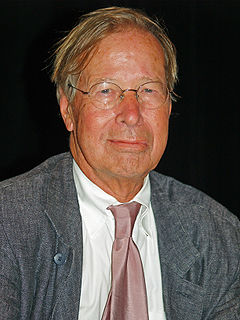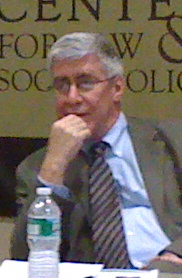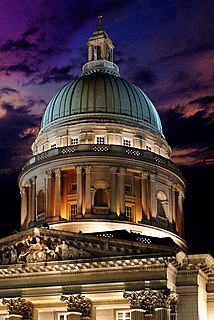Related Research Articles

Jurisprudence, or legal theory, is the theoretical study of the propriety of law. Scholars of jurisprudence seek to explain the nature of law in its most general form and provide a deeper understanding of legal reasoning and analogy, legal systems, legal institutions, and the proper application and role of law in society.

Philosophy of law is a branch of philosophy that examines the nature of law and law's relationship to other systems of norms, especially ethics and political philosophy. It asks questions like "What is law?", "What are the criteria for legal validity?", and "What is the relationship between law and morality?" Philosophy of law and jurisprudence are often used interchangeably, though jurisprudence sometimes encompasses forms of reasoning that fit into economics or sociology.
Legal positivism is a school of thought of analytical jurisprudence developed largely by legal philosophers during the 18th and 19th centuries, such as Jeremy Bentham and John Austin. While Bentham and Austin developed legal positivist theory, empiricism provided the theoretical basis for such developments to occur. The most prominent legal positivist writer in English has been H. L. A. Hart, who, in 1958, found common usages of "positivism" as applied to law to include the contentions that:
The indeterminacy debate in legal theory can be summed up as follows: Can the law constrain the results reached by adjudicators in legal disputes? Some members of the critical legal studies movement — primarily legal academics in the United States — argued that the answer to this question is "no." Another way to state this position is to suggest that disputes cannot be resolved with clear answers and thus there is at least some amount of uncertainty in legal reasoning and its application to disputes. A given body of legal doctrine is said to be "indeterminate" by demonstrating that every legal rule in that body of legal doctrine is opposed by a counterrule that can be used in a process of legal reasoning.
Legal realism is a naturalistic approach to law. It is the view that jurisprudence should emulate the methods of natural science, i.e., rely on empirical evidence. Hypotheses must be tested against observations of the world.

Ronald Myles Dworkin was an American philosopher, jurist, and scholar of United States constitutional law. At the time of his death, he was Frank Henry Sommer Professor of Law and Philosophy at New York University and Professor of Jurisprudence at University College London. Dworkin had taught previously at Yale Law School and the University of Oxford, where he was the Professor of Jurisprudence, successor to renowned philosopher H. L. A. Hart. An influential contributor to both philosophy of law and political philosophy, Dworkin received the 2007 Holberg International Memorial Prize in the Humanities for "his pioneering scholarly work" of "worldwide impact." According to a survey in The Journal of Legal Studies, Dworkin was the second most-cited American legal scholar of the twentieth century. After his death, the Harvard legal scholar Cass Sunstein said Dworkin was "one of the most important legal philosophers of the last 100 years. He may well head the list."
Commercial law – body of law that governs business and commercial transactions. It is often considered to be a branch of civil law and deals with issues of both private law and public law. It is also called business law.

Herbert Lionel Adolphus Hart was an English legal philosopher. He was Professor of Jurisprudence at Oxford University and the Principal of Brasenose College, Oxford. His most famous work is The Concept of Law, which has been hailed as "the most important work of legal philosophy written in the twentieth century". He is considered one of the world's foremost legal philosophers in the twentieth century, alongside Hans Kelsen.
Lon Luvois Fuller was an American legal philosopher, who criticized legal positivism and defended a secular and procedural form of natural law theory. Fuller was a professor of Law at Harvard University for many years, and is noted in American law for his contributions to both jurisprudence and the law of contracts. His debate in 1958 with the prominent British legal philosopher H. L. A. Hart in the Harvard Law Review was important in framing the modern conflict between legal positivism and natural law theory. In his widely discussed 1964 book The Morality of Law, Fuller argues that all systems of law contain an "internal morality" that imposes on individuals a presumptive obligation of obedience. Robert S. Summers said in 1984: "Fuller was one of the four most important American legal theorists of the last hundred years".

Jeremy Waldron is a New Zealand professor of law and philosophy. He holds a University Professorship at the New York University School of Law, is affiliated with the New York University Department of Philosophy, and was formerly the Chichele Professor of Social and Political Theory at All Souls College, Oxford University. Waldron also holds an adjunct professorship at Victoria University of Wellington. Waldron is regarded as one of the world's leading legal and political philosophers.
Riggs v. Palmer, 115 N.Y. 506 (1889), is an important New York state civil court case, in which the Court of Appeals of New York issued an 1889 opinion. Riggs was an example of the judiciary using the "social purpose" rule of statutory construction, the process of interpreting and applying legislation.
Conventionalism is the philosophical attitude that fundamental principles of a certain kind are grounded on agreements in society, rather than on external reality. Unspoken rules play a key role in the philosophy's structure. Although this attitude is commonly held with respect to the rules of grammar, its application to the propositions of ethics, law, science, biology, mathematics, and logic is more controversial.

Taking Rights Seriously is a 1977 book about the philosophy of law by the philosopher Ronald Dworkin. In the book, Dworkin argues against the dominant philosophy of Anglo-American legal positivism as presented by H. L. A. Hart in The Concept of Law (1961) and utilitarianism by proposing that rights of the individual against the state exist outside of the written law and function as "trumps" against the interests or wishes of the majority.
The Hart–Fuller debate is an exchange between Lon Fuller and H. L. A. Hart published in the Harvard Law Review in 1958 on morality and law, which demonstrated the divide between the positivist and natural law philosophy. Hart took the positivist view in arguing that morality and law were separate. Fuller's reply argued for morality as the source of law's binding power.
The legal process school was a movement within American law that attempted to chart a third way between legal formalism and legal realism. Drawing its name from Hart & Sacks' textbook The Legal Process, it is associated with scholars such as Herbert Wechsler, Henry Hart, Albert Sacks and Lon Fuller, and their students such as John Hart Ely and Alexander Bickel. The school grew in the 1950s and 1960s. To this day, the school's influence remains broad.
This is an index of articles in jurisprudence.
Matthew Henry Kramer is an American philosopher, currently Professor of Legal and Political Philosophy at the University of Cambridge and a Fellow of Churchill College, Cambridge. He writes mainly in the areas of metaethics, normative ethics, legal philosophy, and political philosophy. He is a leading proponent of legal positivism. He has been Director of the Cambridge Forum for Legal and Political Philosophy since 2000. He has been teaching at Cambridge University and at Churchill College since 1994.

In Singapore, the rule of law doctrine has been the topic of considerable disagreement and debate, largely through differing conceptions of the doctrine. These conceptions can generally be divided into two categories developed by legal academics, the "thin", or formal, conception and the "thick", or substantive, conception of the rule of law. The thin conception, often associated with the legal scholars Albert Venn Dicey and Joseph Raz, advocates the view that the rule of law is fulfilled by adhering to formal procedures and requirements, such as the stipulations that all laws be prospective, clear, stable and constitutionally enacted, and that the parties to legal disputes are treated equally and without bias on the part of judges. While people subscribing to the thin conception do not dismiss the importance of the content of the law, they take the view that this is a matter of substantive justice and should not be regarded as part of the concept of the rule of law. On the other hand, the thick conception of the rule of law entails the notion that in addition to the requirements of the thin rule, it is necessary for the law to conform with certain substantive standards of justice and human rights.
Henry Melvin Hart Jr. (1904–1969) was an American legal scholar who was an influential member of the Harvard Law School faculty from 1932 until his death in 1969.

Law's Empire is a 1986 text in legal philosophy by Ronald Dworkin, in which the author continues his criticism of the philosophy of legal positivism as promoted by H.L.A. Hart during the middle to late 20th century. The book introduces Dworkin's Judge Hercules as an idealized version of a jurist with extraordinary legal skills who is able to challenge various predominating schools of legal interpretation and legal hermeneutics prominent throughout the 20th century. Judge Hercules is eventually challenged by Judge Hermes, another idealized version of a jurist who is affected by an affinity to respecting historical legal meaning arguments which do not affect Judge Hercules in the same manner. Judge Hermes' theory of legal interpretation is found by Dworkin in the end to be inferior to the approach of Judge Hercules.
References
- The "Hart-Dworkin" Debate: A Short Guide for the Perplexed
- Beyond the Hart/Dworkin Debate: The Methodology Problem in Jurisprudence
- Keith Culver (Autumn 2001). "Leaving the Hart–Dworkin debate". The University of Toronto Law Journal. 51 (4): 367–398. doi:10.2307/825911. JSTOR 825911.